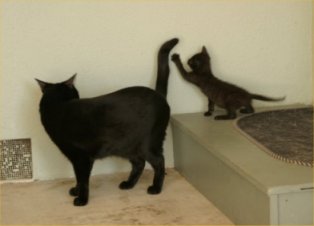
Haiti, especially as a Catholic country, is an excellent means for testing the power of prayer.
Did God make this horrendous earthquake happen as a punishment for the people of that land, including the babes in arms? If He did, what was the crime, and did each and every one of the dead deserve it?
As the religious center of hope and sustenance for the millions of Catholics, why did God, if there is one, choose to destroy the cathedral?
If the land is prone to earthquakes around and close to Port au Prince, it appears to me that it would be unwise to rebuild the city on its current site. It might be good to rebuild in an area that is more geologically sound. This might be accomplished with a good deal of the donated funds. Or a rich large landholder might even donate his land. And it would surely make the destruction of the dead city and buiding of a new one much less expensive. Just a thought. In any event, it will offer hope for employment to the masses who need it so badly, especially right now and into the future.
I would imagine that everybody actually prays, even atheists. How many times have I said to myself, “Oh my god, how could such a terrible thing happen?! Please don’t let any more of them die, and so horribly!”
In circumstances like these, I always think and mutter such phrases, although to a being which I doubt exists.
But my prayers, I can assure you, are just as sincere, even if there is no god. If there actually is a God, He will hear my prayers as well.

LittleBill
1/16/10

In a blog about the disappearance of workhorses, I mentioned that they have largely been replaced by tractors. A living, hardworking, loving animal has been replaced by technology.
The same thing is happening to human beings now. There is nothing more important to those who govern and those who are governed than JOBS. And yet there seems to be little or no awareness of the fact that humans have pretty well outlived their usefulness, and they just cost too much to employ. Like the workhorse, humans have been replaced by technology.
Isn’t it amazing that the human mind, which created machinery to begin with, is now being replaced as well by Frankenstein?!
1/7/10
The Socialist
 When I was young, I grew up on a ranch in Wyoming. My family were well-to-do, so the ranch was a retirement home. My father didn’t do any physical work unless it was for pleasure, which it often was. We ran a few cattle, and we had riding horses and two teams of workhorses. No one out our way had electric lights or telephones until we moved in and had the wires extended from town. (The telephone line was communal, so we all took turns on using it. If it was busy, you just waited. Our telephone number was 28.)
When I was young, I grew up on a ranch in Wyoming. My family were well-to-do, so the ranch was a retirement home. My father didn’t do any physical work unless it was for pleasure, which it often was. We ran a few cattle, and we had riding horses and two teams of workhorses. No one out our way had electric lights or telephones until we moved in and had the wires extended from town. (The telephone line was communal, so we all took turns on using it. If it was busy, you just waited. Our telephone number was 28.)
One day we children were whisked into town for the day, but I know what went on. A large hole was dug down closer to the barn, and the four workhorses were led into it. Then, one-by-one, they were shot. My father was a kindly man, but I do not recall why he had that done. All I can remember is that, after that, we had tractors—and no work horses. One of our saddle horses died of sleeping sickness (possibly near that time), and it may have been that the other horses were also coming down with it. I just don’t know.
It has always been my belief that most ranch hands have felt love for the animals they worked with. Red, our ranch hand, had no family that I was aware of, and no car to get there. This was 70-some years ago. Not everyone had cars, many hitch-hiked, and there was little to do in town except drink and look up the “girls.” He probably hitched a ride into town with Elmer, the foreman.
Thinking about that time from the viewpoint of the ranchers, having no car, and nothing much to do when you got there must have been a pretty lonely life for a ranch hand, especially if he was the only one on a ranch and uneducated to boot.
But this is not just about one family, one ranch, and four horses. It is about the beginnings of a time when so many ranchers and/or farmers were making changes, abandoning live animals for machinery. It is about a large part of human life when too many people (in town as well as country) began to turn from a life of depending on animals as well as returning their love to using things made of metal and glass in their stead.
By the same token, people began to turn from country living to living in cities packed close to each other. The odd thing is that, in a world long past, people could live far apart, yet count on each other at harvesting time, as well as when emergencies arose. And you always waved at everyone you passed, whether you knew them or not.
On the other hand, if you move into a large town or city, the tendency is to ignore most everyone, even your neighbors (sometimes even those in trouble.)
Here I am at the end of my blog, and where do I find myself without even realizing it? Pointing out a major part of what happens to humans as our numbers increase.
ARW
1/6/10




